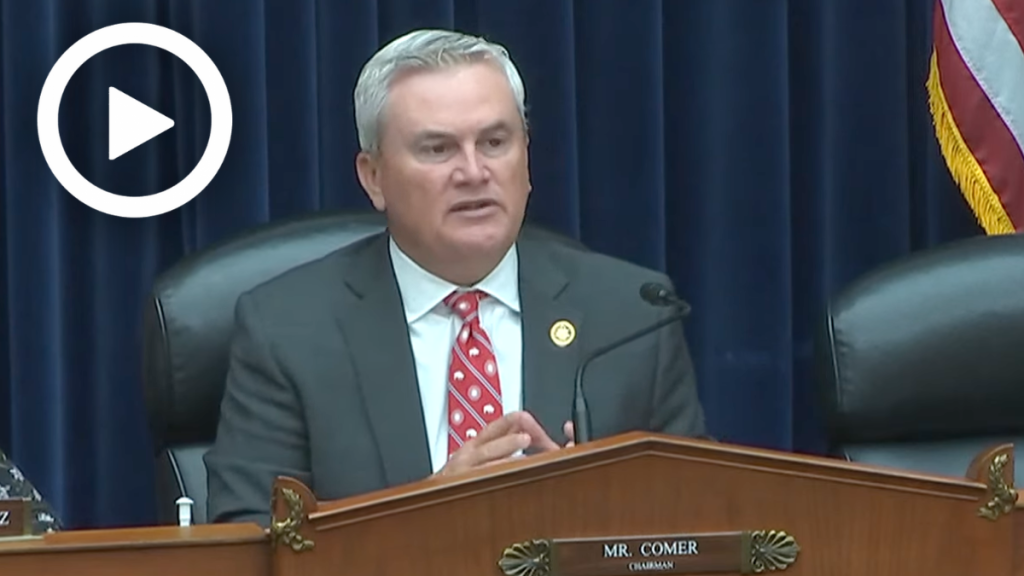Comer Opens Hearing on Unlawful DEI Programs and EEOC’s Duty to Enforce Title VII of the Civil Rights Act
WASHINGTON – House Committee on Oversight and Accountability Chairman James Comer (R-Ky.) today delivered opening remarks at a hearing titled “Standing Up for the Rule of Law: Ending Illegal Racial Discrimination and Protecting Men and Women in U.S. Employment Practices.” Chairman Comer stressed that the Equal Employment Opportunity Commission (EEOC), created by Congress, has a duty to enforce Title VII of the Civil Rights Act of 1964 against U.S. companies in instances where unlawful employment practices discriminate on the basis of race. He noted that the EEOC appears to be giving a free pass to U.S. companies pushing unlawful diversity, equity, and inclusion (DEI) programs and the Commission needs to stand up for the rule of law and investigate such practices. He concluded that the House Oversight Committee is prepared to examine EEOC’s actions to ensure the Commission is appropriately enforcing the law and protecting men and women in the workplace.
Below are Chairman Comer’s remarks as prepared.
Good morning, I want to welcome everyone to this hearing before the Committee on Oversight and Accountability.
In recent years, diversity, equity, and inclusion, or DEI initiatives have become a divisive subject in U.S. businesses, educational institutions, state legislatures, and here, in Congress.
Unfortunately, many of these initiatives—which many assume simply promote equal opportunity—have in some cases become integrated into employment practices to a point where the civil rights of employees are violated.
DEI in some forms means preferencing racial categories and disfavoring other racial categories. It’s discrimination with a fancy acronym.
Racial discrimination is wrong. It is immoral. And it is illegal in the employment context.
Next Tuesday, July 2, we will celebrate the 60th anniversary of the enactment of the Civil Rights Act of 1964 into law.
Title VII of that law makes it an unlawful employment practice to discriminate in hiring or against employees once on the job because of their race, color, religion, sex, or national origin.
When employers systematically implement employment practices that discriminate on the basis of race, it doesn’t matter that it’s dressed up in a fancy acronym like DEI.
The law says that’s illegal racial discrimination.
And it’s illegal whether the victim of that discriminatory practice is white, black, Native American, or any other racial category.
All one needs to do is review the disclosures of many Fortune 500 companies to witness the implementation of literal racial quotas in hiring and promotion.
Hiring managers and executives are encouraged by their companies to institute hiring quotas on the basis of race or face cuts to their compensation or incentives.
Can you imagine the disgust of those who crafted the Civil Rights Act to find out that 60 years later some of the largest and wealthiest companies are still not just implementing, but publicly celebrating the racial discrimination at their companies?
State attorneys general have called out companies advancing such discriminatory practices such as, quote— “explicit racial quotas and preferences in hiring, recruiting, retention, promotion, and advancement.” End quote.
They also have also recognized those practices to include, quote— “race-based contracting practices, such as racial preferences and quotas in selecting suppliers, providing overt preferential treatment to customers on the basis of race, and pressuring contractors to adopt the company’s racially discriminatory quotas and preferences.” End quote.
I will enter the attorneys general July 13th, 2023, letter into the record with unanimous consent.
Without objection so ordered
The Equal Employment Opportunity Commission, or EEOC—the federal agency responsible for enforcing federal laws against illegal racial discrimination and harassment in all types of work situations—should stand up for the rule of law and investigate such practices at U.S. companies.
The EEOC should also reiterate the plain language of Title VII prohibiting racial discrimination in everything it does: through guidance, public statements, data collection, litigation, or otherwise.
Yet under the Biden Administration, the EEOC has demonstrated a pattern of public activity inconsistent with the law.
And when presented with evidence of discriminatory practices at companies, the EEOC appears to have taken no action at all.
In the worst cases, EEOC appears to have filed amicus briefs actually defending the ability of companies to engage in racially discriminatory practices.
We are encouraged that EEOC Commissioner Andrea Lucas has been outspoken in support of the law, arguing, correctly, that Title VII is violated if race was at all or part of the motivation for an employment decision.
On March 1, 2024, I wrote the EEOC along with subcommittee Chairman Pat Fallon seeking a briefing and documents and information to conduct oversight of this matter.
Since that time, I have been alarmed as well with EEOC redefining sex discrimination through guidance in a way that will jeopardize the rights of men and women in the workplace.
On April 29, 2024, the EEOC issued an updated workplace harassment enforcement guidance, its first since 1999.
This includes new language requiring employers to permit male employees to use female changing areas and bathrooms.
Many states immediately sued the EEOC after the issuance of the new guidance on the grounds of government overreach, and those states seek injunctions to prevent its implementation.
EEOC Commissioner Lucas has called out the new guidance for effectively eliminating single-sex workplace facilities in addition to intruding on the right to freedom of speech and belief.
Thank you to the witnesses appearing here today, and I now yield to the Ranking Member for his opening remarks.
